"Sometimes I think it would have been easier not to survive." One person's story of deportation from Mariupol
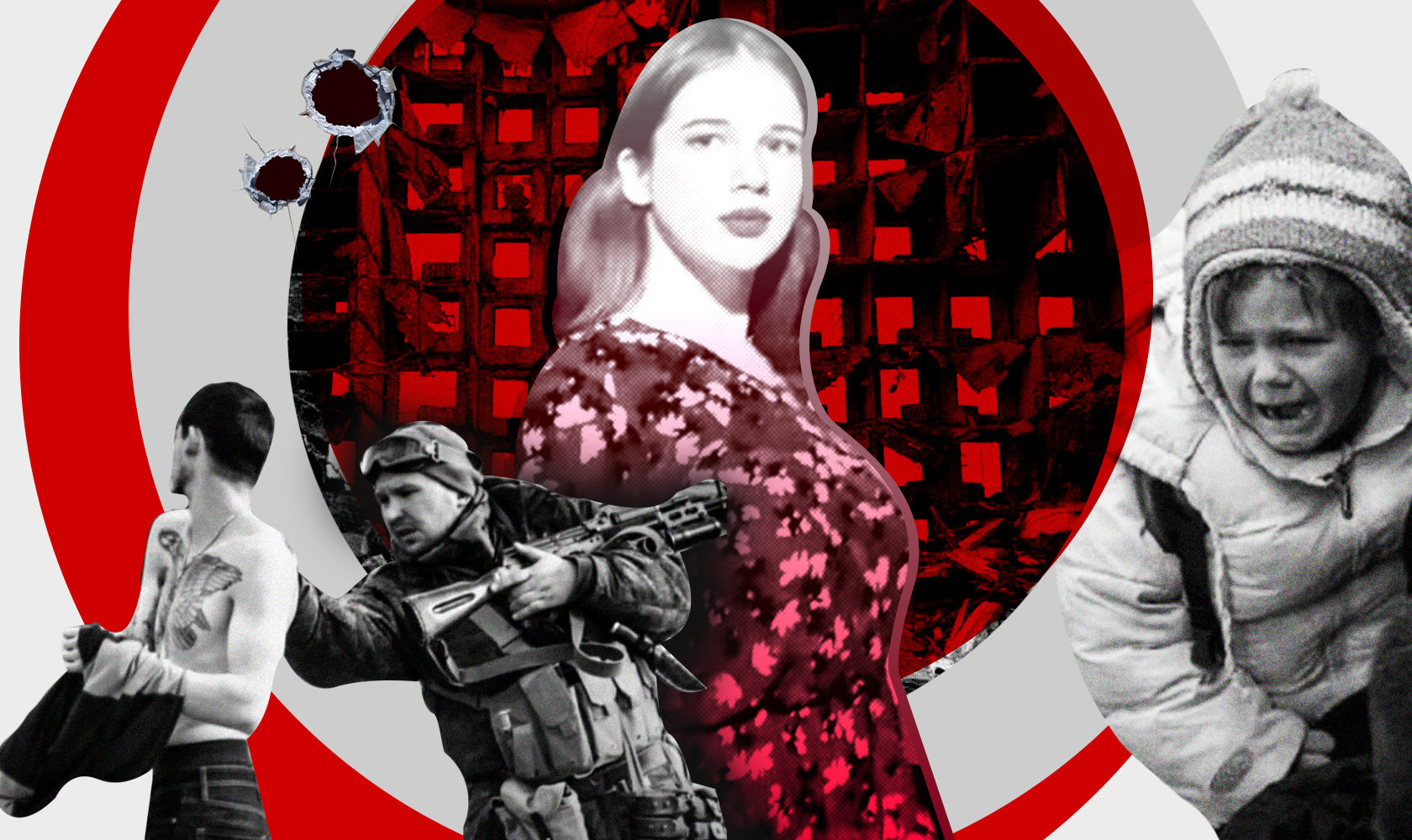
During the four months of Russia’s large-scale war against Ukraine, the name of the half-million-strong city of Mariupol has been synonymous with pain.
Grad multiple rocket launchers, aerial bombardment, the maternity hospital, the drama theatre, mass graves, Azovstal, full occupation, the destruction of any traces of war crimes, food in exchange for taking part in TV filming on 9 May, the threat of cholera. The losses of civilians and the captured defenders of the city have been huge.
All this was accompanied by two other processes that seem like unspeakable savagery in 2022 - deportation and filtering.
Russia, which forcibly expelled the Crimean Tatars from their historic homeland - now occupied Crimea - in 1944, has resorted to doing the same thing again for the second time in 78 years, this time 500 kilometres east, in Mariupol, Donetsk Oblast.
In four months of war, Russia has deported more than a million citizens from all over Ukraine. And only a few of those people were able to escape and are prepared to talk about it.
One of them is 21-year-old Polina Kovalevska from Mariupol. She and her family survived the siege, filtration and deportation, and have been able to leave for Europe.
"Sometimes I think it would probably have been easier not to survive at all," she admits in the middle of her conversation with Ukrainska Pravda. "How is it possible to live, knowing that so many people have died? How is it possible to want to go back to Mariupol, if it is now a cemetery?"
Ukrainska Pravda has described the life story and deportation of the Kovalevski family in detail in order to record another of Russia’s war crimes. Which Russia will never wash away from its hands.
Pre-war Mariupol
Polina was born and raised in Mariupol, just like her whole family - her mum, dad and two sisters.
Polina’s mother plays the domra [a stringed instrument similar to the lute] and piano, her father sings and plays the guitar, her older sister is studying piano at the conservatory, and the younger one is studying violin at music college.
Polina herself broke with the family tradition and went to study programming first, then sociology, and now she is involved in photography, although she can also play the piano and cello. She is still waiting for news from her Mariupol cello teacher.
She describes the Mariupol of her childhood as a typical post-Soviet city - houses, playgrounds, factories. Only the sea distinguished it from other cities. However, after 2014, when Mariupol became the new regional centre of the Donetsk region, it began to change. As did its residents.
"Before the 2014 war, the city could not have been called either pro-Ukrainian or pro-Russian - we probably just lived our lives and were apolitical. And then in 2014 the question arose: do you want to move towards Europe, or Russia?
I was in 7th grade at that time. Two of my friends who went to the Russian Orthodox church were [drawn] to Russia. And I was more drawn to Europe, it was closer to me. I’d seen Russia, there is nothing special there," Polina says.
Her parents, who had avoided politics until 24 February 2022, decided to turn off the TV for their children in 2014. In 2022, Russia would turn off everything in Mariupol.
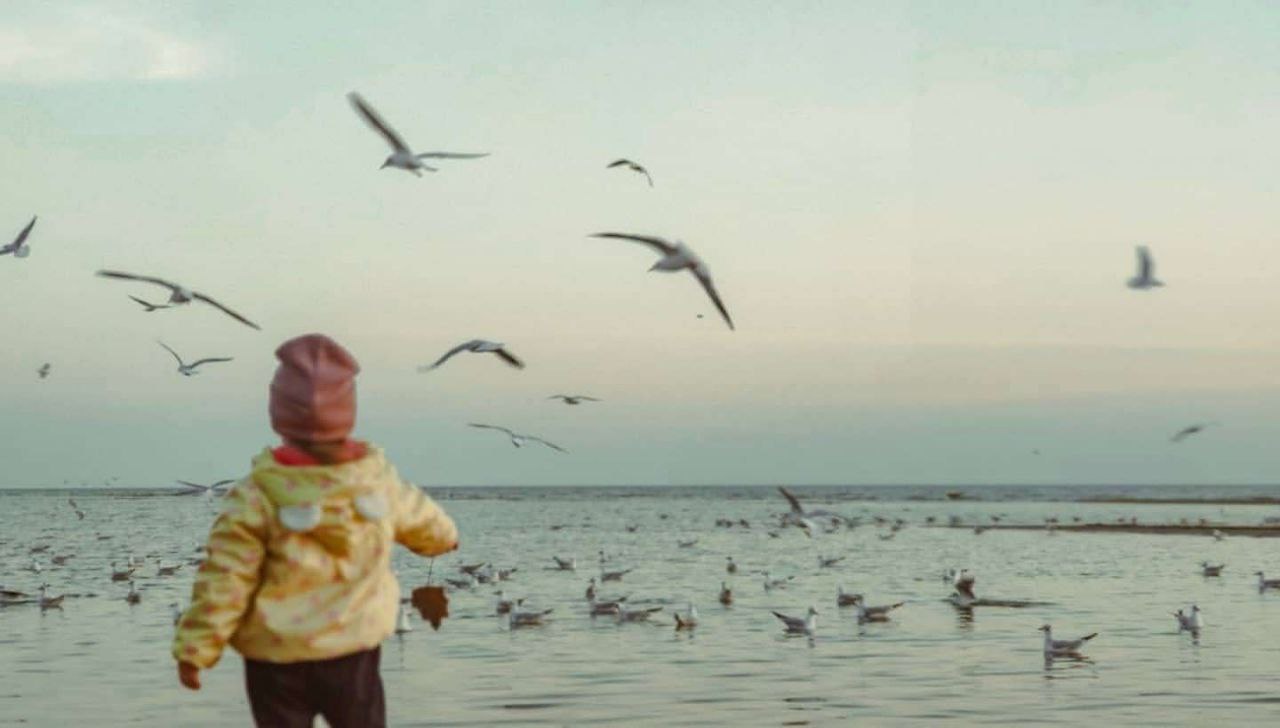
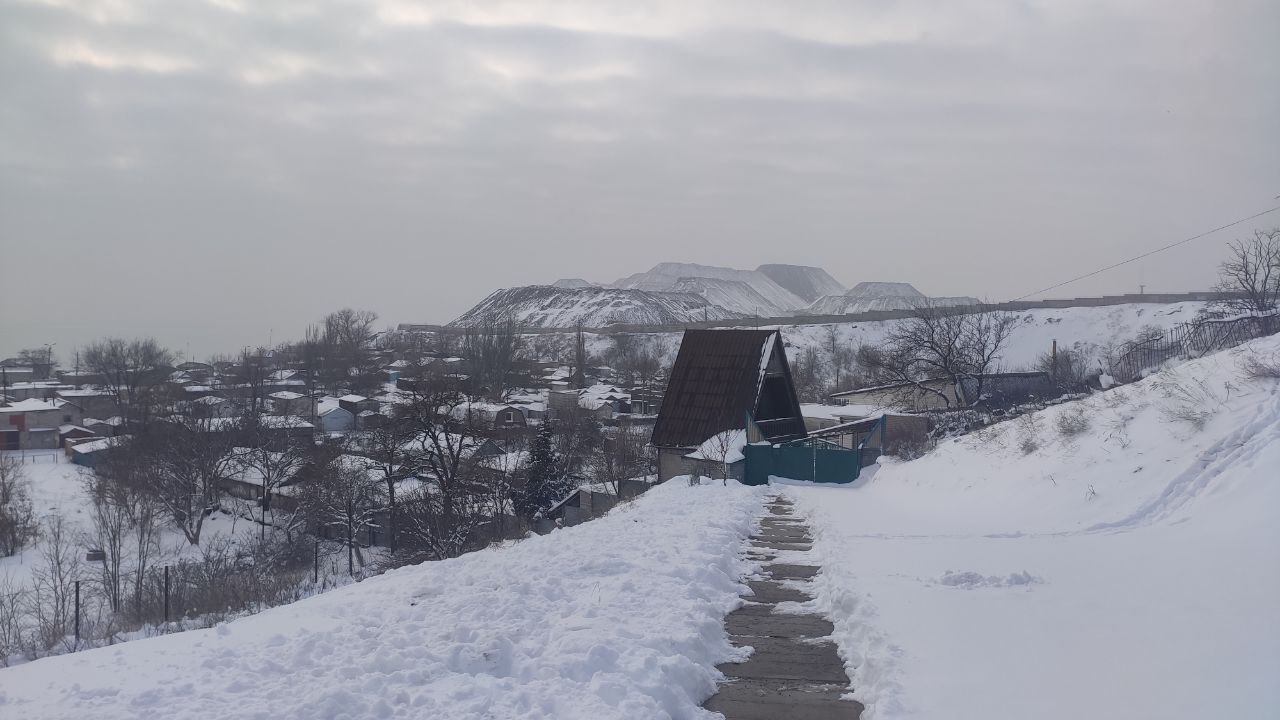
When Polina was a little older, she would go and see the marches on the day of the liberation of Mariupol [Mariupol was liberated from the Russian invaders on 13 June 2014, and ever since then the city has celebrated the anniversary of this date], and even watched the Azov Battalion training.
Polina did not notice any special attitude towards the Azov defenders in the city, neither particularly positive or, as Russian propaganda would have it, negative: "Everyone regarded them as people in uniform who have to work.
During the training, many of their guys [from the Azov Regiment] looked very educated, friendly and smiley. Even during the war, when there were very few of them left at the end of March, and I asked what they were going to do next, they just smiled…
They had no food or water left. I took out a glass of water for one [of the Ukrainian defenders] - and it may sound strange now, but when we had 2 litres left, and they had nothing - it meant a lot. Both to him and to me. I don't know how they could have survived then," Polina recalls.
All the local sites [that featured] in the worst news this spring have their own special significance for Polina. The Azov headquarters was located near her home; the Azovstal steelworks was where her aunt worked; the drama theatre was a meeting place for local young people and a place to celebrate graduation from the technical lyceum.
"But I try not to think about it," Polina says quietly. "It doesn’t exist now, you know?"

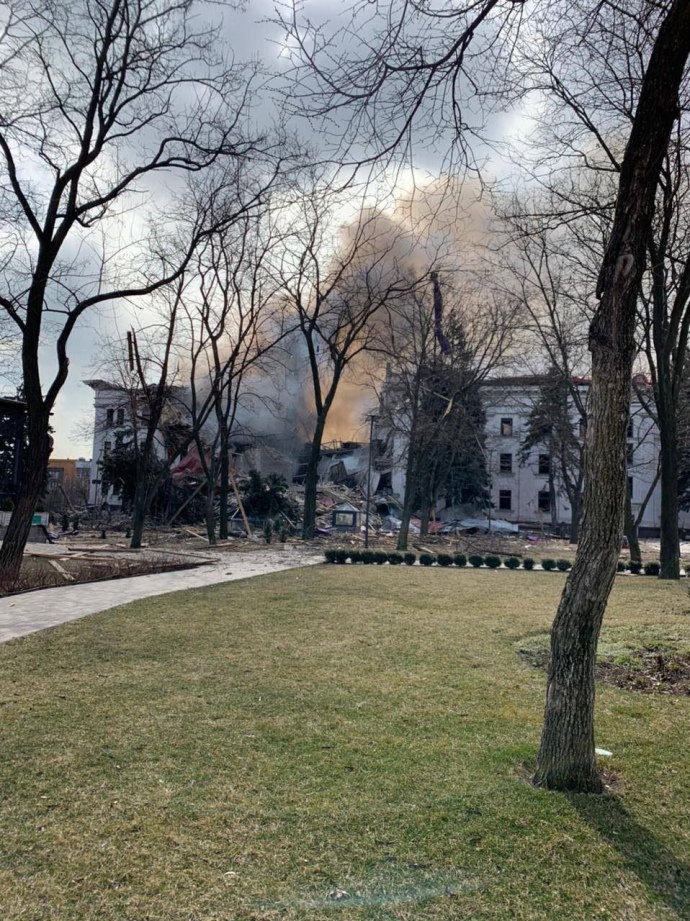
The beginning of the war
Polina began preparing for war on 21 February, when Putin "recognised" the "independence" of the pseudo-republics in eastern Ukraine [on 21 February, Russian President Vladimir Putin signed decrees recognising the Donetsk and Luhansk People’s Republics]. However, Polina would do it in a unique way - she would go to take a shower every night and wash her hair.
Once the war started, she did not see hot water again for more than a month.
Polina recalls that the atmosphere in Mariupol in early February was mostly calm - no one believed that a major war was about to break out. Including her parents, whom she was trying to persuade to leave.
Although, taking into account the reports coming in from foreign intelligence, the student organisation Studrespublika arranged a discussion in the city on ways to achieve peace, and on 13-16 February, the Azov Regiment organised another training course for locals.
The Ukrainian defenders taught people how to shoot and provide first aid. Within just a few days, those skills would become vitally necessary in this city.
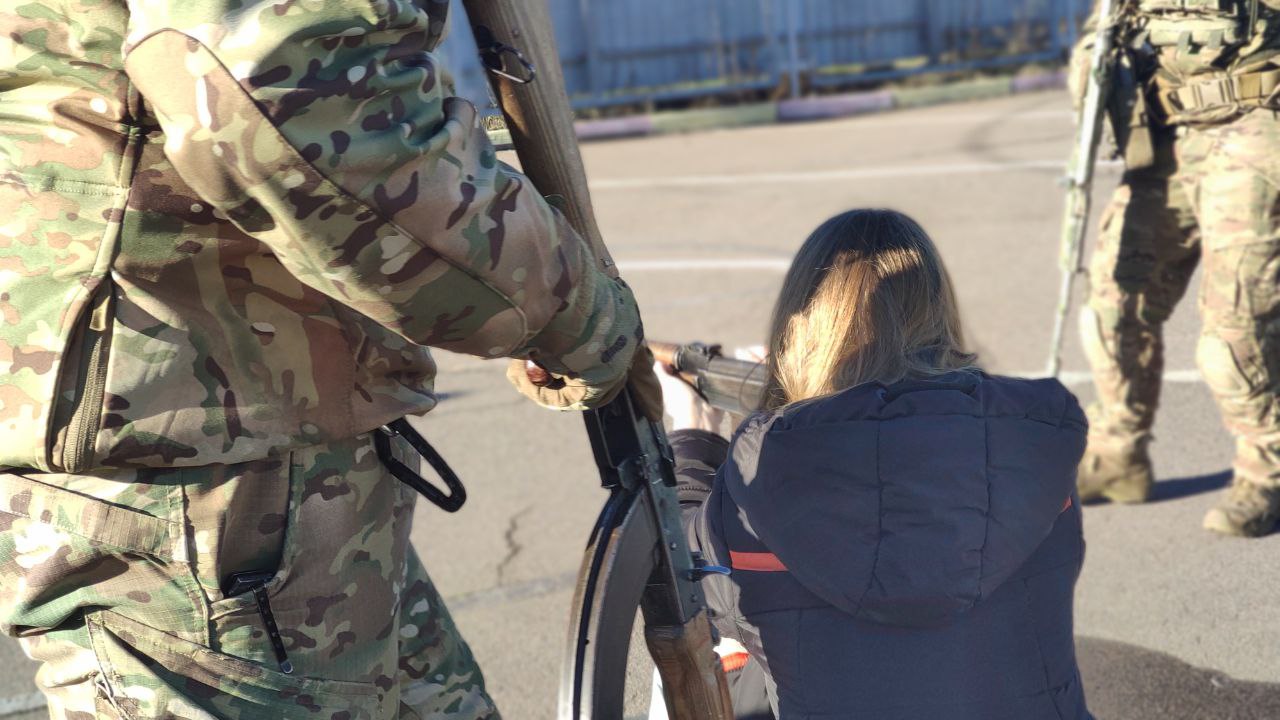
On 24 February, when the first Grad multiple rocket launchers hit Mariupol and missiles hit Kyiv and Kharkiv, Polina was planning to celebrate her 21st birthday.
"My mum came to me in the morning and I told her, 'Mom, there are explosions! Maybe this is the start of the war?’ She said no and told me to calm down and go back to bed. Then my dad came in and played ‘Happy Birthday’ on the guitar, and Mum brought in a cheesecake and offered me some wine. And I said, "Mum, I’m not going to drink wine - if we have to go to a shelter, I just won’t be able to deal with it," Polina recalls.
Her family first went to a shelter on 2 March. Until then they remained in their apartment in the Livoberezhnyi [Left Bank] district of the city. Their house was midway between the sea and the most tragic point of defenсe of Mariupol - the Azovstal steelworks.
Everyone in the apartment slept in the hallway until Polina and her younger sister Liza got tired of it. One time they decided to move to the bed under the window.
"And here, at 5 am on 2 March, the building next door was hit - our windows were falling in. I grabbed Liza's hand and we ran into the hallway. They were firing very hard. Then we saw that the [neighbouring] building had already burned down.
I made a sarcastic video at the time: ‘Look how the Russians are "liberating" us.’ But I couldn’t post it - on 2 March, the connection and the Internet were turned off. The video had to be deleted, it couldn't be saved," Polina said.
Life in shelters
Polina's family spent five days in the first shelter, the City Palace of Culture, from 2 to 6 March. The Azov headquarters was located nearby.
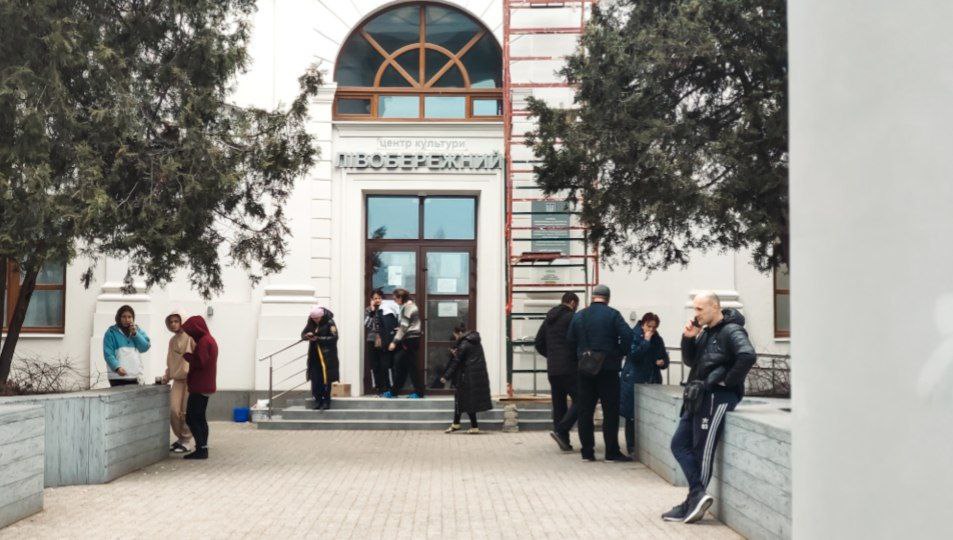
On 5 March, the Ukrainian military came to the shelter with the words, "It’s going to be hardcore - hold on." And the "hardcore" began the next day - the Russians began to hit the palace building.
On 6 April, the roof caught fire and slid off, stones were falling, and the smell of burning quickly reached the basement - there was smoke everywhere. Polina and her sister soaked rags in water and applied them to their faces, and the men tried to put out the fire.
A police major who was in the shelter reported the fire in the Palace of Culture using a walkie-talkie, then Ukrainian soldiers came to collect people in an armoured car and a Bogdan bus [a big bus]. Fortunately, everyone was rescued.
The civilians were moved to the building of the Livoberezhnyi District State Administration just a few minutes’ walk away [from the Palace of Culture]. Other shelters were already overcrowded.
For the first few days, police officers stayed with the people in the District State Administration, giving them a sense of security, but eventually they left. There were gradually fewer and fewer people. They still had food and water.
On 16 March, the occupiers approached the District State Administration, in their armoured vehicles marked with the letter Z. The Ukrainian military, located in several buildings and a nearby park, opened fire on them. In their chaotic response, the Russians hit the [building of] the District State Administration. Once again, a huge fire started. This time the people of Mariupol were able to extinguish it on their own - there were firefighters in the building.
"There were constant shootings around the District State Administration, there was close fighting. I kept on saying, ‘Another 2-3 days, and something has to be decided.’ But the front line was moving back and forth," says Polina.
Sometimes people could listen to the radio in the shelters, so Mariupol residents heard the calls from Iryna Vereshchuk [Ukraine's Deputy Prime Minister and Minister for the Reintegration of Temporarily Occupied Territories] to leave the city in their own cars, because the centralised evacuation was constantly being disrupted.
But some private cars in Mariupol had been burnt out in the first few days, and some people did not own cars at all.
Those who lived in the Livoberezhnyi district, which is located closer to the "DPR" [the self-proclaimed Donetsk People’s Republic] and separated from the Central District by the Kalmius River, did not know how to get past Azovstal to the centre, where the evacuation was to depart from. Nobody explained how.
"We’d listen to Zelenskyy saying,‘Dear Ukrainians, our defenders ... Mariupol is a hero city. You're great, you're holding on.’ But [there was] no practical help.
I don't know how they were going to defend Mariupol if it was surrounded… I have the impression that it was just a deliberate sacrifice for the sake of Ukraine. I have no other explanation," Polina worries.
On 26 March, three or four Ukrainian soldiers who had no food or water left arrived at their shelter. They occupied the third floor and agreed not to cross paths with the civilians living on the ground floor. However, some of the civilians, anticipating that the presence of the military would make them a more visible target for the Russians, moved to other buildings.
Also on 26 March, the Russians began dropping something powerful on the Livoberezhnyi District State Administration building - either aerial bombs or missiles. One of them broke through several floors and reached the basement where Polina's family was living - their legs were covered [with rubble].
"We would constantly hear, ‘Air! Air!’ from the walkie-talkies of the soldiers who came down to help us. At first I thought there was a fire and we had to go outside. And then I realised what it meant: planes, the planes are coming.
The only thing we could do when we heard this was to open our mouths wide. So that if we survived, we wouldn’t go deaf," Polina recalls.
Her family spent the night in the damaged building, not wanting to break the curfew, and in the morning they moved to their third shelter - city hospital No. 4.
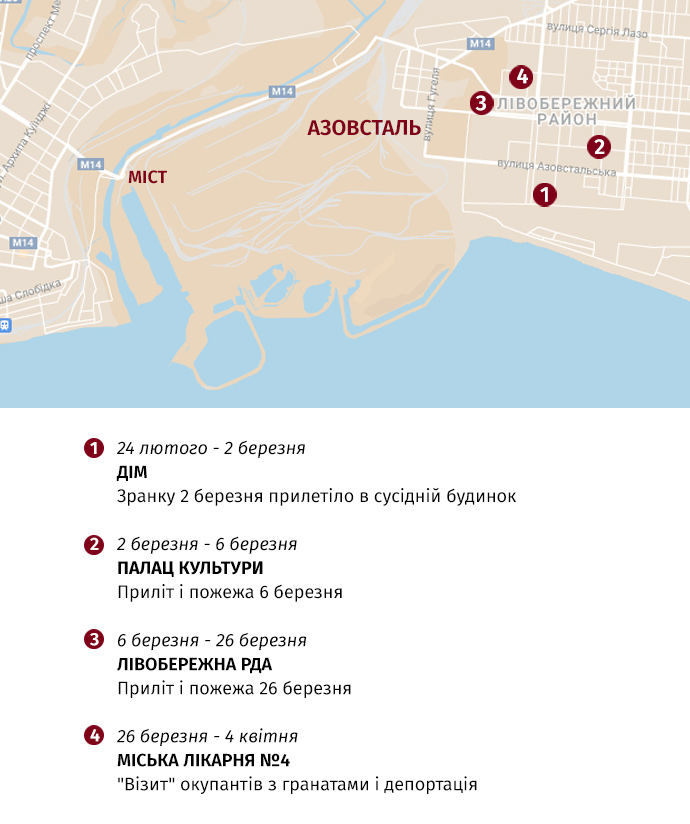
Deportation
Polina's family was deported from Mariupol on 4 April, the 40th day of the war.
The main topic in the Ukrainian and foreign media at the time was the atrocities committed by the Russians in Bucha, Irpin and Motyzhyn. The need to save the Mariupol garrison was just beginning to become public knowledge.
The day before, on 3 April, Russian soldiers broke into the general department of the city hospital where Polina's family was hiding. At that moment, the clinic and surgery [buildings] had already burned down due to Russian strikes.
The Russians threw grenades at the general building, shot at the upper floors, broke the iron door into the basement and, finding civilians there, announced an "evacuation".
The family could not evacuate the same day because they were afraid of being separated from Polina's sister, who was hiding in a nearby shelter - a canteen. There has been no [phone] network in Mariupol for more than a month.
Polina's mother's first attempt to reach the canteen was unsuccessful - the occupiers were firing from a tank and not letting people go outside.
"They said, 'We’ll knock on the shelter ourselves. If they don't open up, we'll throw a grenade in there.’ My mum said, ‘A grenade? My daughter’s in there, believe me, there are no soldiers there!’ So my mother went there with the soldiers, knocked on the door herself - there was a special code there - collected her daughter and Andrii (a man the family had met in one of the shelters - Ukrainska Pravda), and came back to us," says Polina.
In Bezimenne, Polina was able to make contact with the outside world for the first time. She told everyone she knew the most important news: she had survived.
At the local school where the occupiers put the Mariupol residents, the Internet was working. There they were given questionnaires with a choice of place of deportation: the "DPR" [the self-proclaimed Donetsk People’s Republic] or Russia.
It was not possible to go to territory controlled by the Armed Forces of Ukraine.
"We decided that there would be more chance of leaving for Ukraine or Europe from Russia than from a ‘banana republic’. So we chose Russia, or rather Taganrog - there was a bus going there," Polina says.
After a few days the bus arrived in Taganrog, Russia, 100 kilometres from her native Mariupol.
On the way to its destination, the bus made two stops: at the Ukrainian village of Uspenka, which has been occupied since 2014, and the Russian village of Matveyev Kurgan, Rostov Oblast [Russia].
In Uspenka, the occupiers checked the Mariupol residents’ documents and talked to everyone for no more than 5 minutes. But at Matveyev Kurgan, Polina's family (more precisely, only one of her family members - her father) was forced to undergo a shameful filtering procedure.
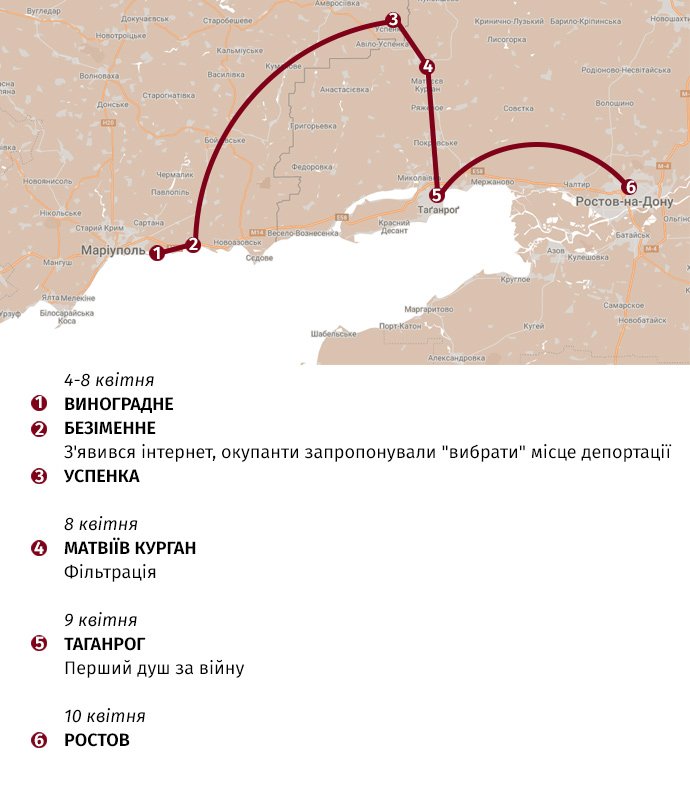
Filtration
On 8 April, all the women from Polina's family were placed in a tent camp in Matveyev Kurgan, Russia. There were beach chairs and sleeping bags inside, and looted Ukrainian humanitarian aid — the Russians hadn’t even scratched the Ukrainian flags off the boxes.
Polina recalls that it was very cold outside. She fell asleep and waited for her dad.
Her dad was lucky - he returned to the tent safe and sound. Probably because it was "difficult to find anything" on him - he’d spent his life making music, and before that he’d served in the Soviet army.
"But I’ve heard stories about people being interrogated very harshly, for several days, if someone aroused suspicion. Andrii (the man whom the family met in one of the shelters - Ukrainska Pravda), who was trying to evacuate after us - now he is also in Estonia - was put in a holding cell (an isolator - UP) for 4-6 days. He was beaten. It turned out that he had some contact with Azov long ago," says Polina.
Polina asked her father a little about the filtration procedure itself - she knows that the men had to stand close to each other for several hours and could not leave the place of interrogation, even to go to the toilet. Meanwhile, the occupiers checked their phones.
After several hours of filtering, Polina's family managed to get on the last bus to Taganrog and arrived there on the morning of 9 April.
There, in a regular school, after sleeping on regular mattresses on the gym floor, they were able to have a shower for the first time since 2 March.
Taganrog was the first Russian city in which Mariupol residents were allowed to leave their places of detention. At least on the first day. Polina went to visit an old friend of hers in Rostov and waited there for her family, who were to be transported there by the occupiers.
"And when they were already in Rostov, my mother texted, ‘We were dropped off behind an iron fence, and now these men with beards won’t let [us go] anywhere. They said that everyone would be taken even further away - to Vladikavkaz’ (900 kilometres from Mariupol - UP).
I said, ‘Mum, get out of there!’ And they were the only ones to negotiate with the driver that he would take them, with the curtains closed, to the centre of Rostov. They were lucky," says Polina.
A long road to Europe
After Rostov, a new chapter began for Polina’s family entitled "Leaving Russia with no money, but with the support of caring people".
Russians, complete strangers, would let Polina's family spend the night [at their place], gave them dinner, and even paid for inter-state and international tickets. Mariupol residents did not have roubles, and no bank cards can be used in Russia except Sberbank cards.
The man who was the first person in Rostov to shelter the family prepared soup, meat and grilled vegetables, gave them his bed, and bought tickets to St. Petersburg.
"He said, 'When you're in Estonia, send me a happy photo captioned, "Farewell, Unwashed Russia’", Polina recalls.
Then, on 13 April, in St. Petersburg, Polina's family stayed with people who support Ukraine and have now left for Armenia.
They offered to buy them basic necessities - including new sneakers for Polina, because her own were burned - and tickets to Estonia.
As they moved from one Russian city to another, Polina didn’t hold back from complaining about the Russians - even to those who helped them.
Everyone reacted calmly.
According to Polina, "No decent Russian will be offended by the words ‘All Russians are bad’ after what Ukrainians have experienced.
But there was one young man from St. Petersburg… I said I’d come up with a business idea - a footstool with a Russian flag on it (I’d just seen someone wiping his feet on the Ukrainian flag in Mariupol). And it did offend him a little," the young woman says.
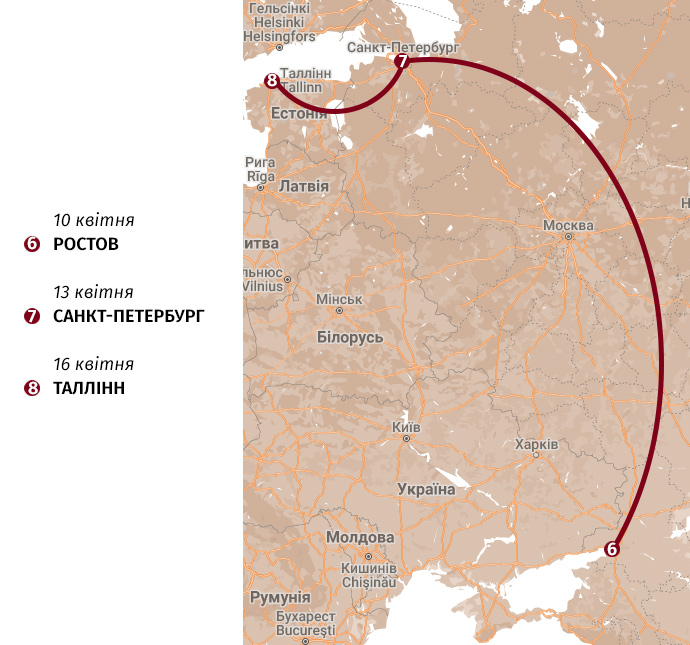
Finally, on 16 April, in Tallinn, Estonia, the family from Mariupol was met by emigrants from Russia and Belarus. Polina's family is still living with their neighbours, who left to travel around Finland during the summer.
So far, they are doing fine there. They have the sea too, though it is colder than in Mariupol.
In Estonia, Polina is looking for a new university, especially educational institutions in Poland and Spain. Mariupol State University has temporarily moved to Kyiv, but she does not plan to go there in the near future.
Mostly because she does not want to waste the energy and money of all those who helped them leave Russia.
The danger of an attack on Kyiv, and especially missile strikes, still remains.
When asked whether she would ever want to go to her native Mariupol, Polina hesitates. For her, it is now primarily one large grave.
"I want to forget everything and forgive. But I realise that if something bad happens to me, I can forgive it, but if [it happens] to my relatives or friends, I can’t," Polina said as our conversation came to a close.
"The neighbour we hid with on the first day has been killed. My teacher was killed. I still don't know where my uncle is - he hasn’t been in touch. There are a lot of people whose absence I can't forgive. It would be unfair.
On the other hand, I understand that the military is fighting for us so that we don’t suffer and feel guilty. My guilt will not help anyone.
We have to be happy, even though it is very difficult.
I am trying to be happy," she added.
After this article was published, Polina told Ukrainska Pravda that her uncle's body had been found after the rubble was cleared away. His whole family died with him.
Olga Kyrylenko, Ukrainska Pravda